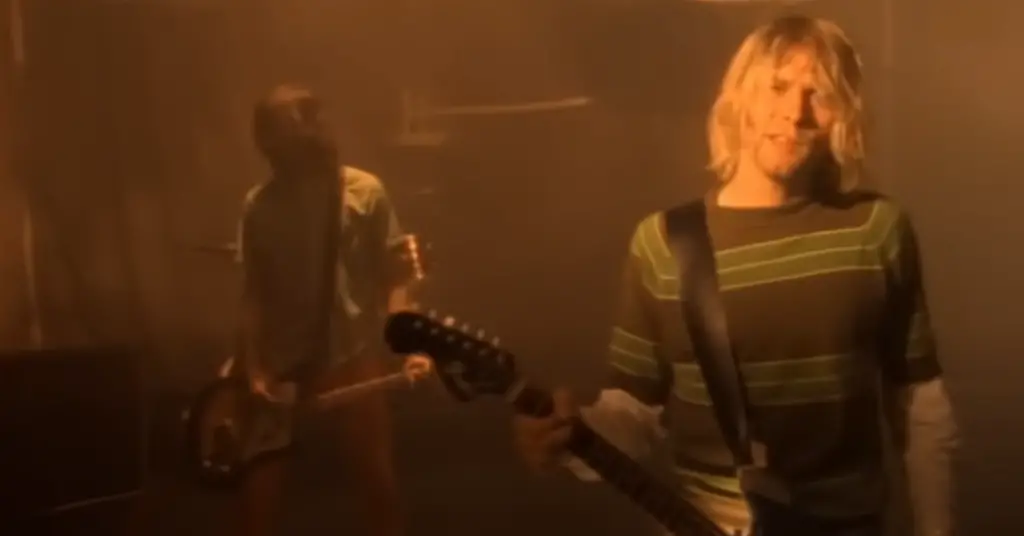Nirvana – “Smells Like Teen Spirit”: The Anthem That Accidentally Changed Everything
When Nirvana released “Smells Like Teen Spirit” in September 1991, they didn’t just drop a new single—they lit a fuse under an entire generation. Within months, the song exploded onto mainstream radio, blowing hair metal off the charts, dragging grunge into the global spotlight, and giving the ‘90s its snarling, slouching voice.
Driven by Kurt Cobain’s primal scream, Krist Novoselic’s pummeling bassline, and Dave Grohl’s ferocious drums, “Smells Like Teen Spirit” was as chaotic as it was catchy. And that contrast—raw noise vs. undeniable hooks—is what made it unforgettable.
The Sound: Loud, Louder, Nirvana
“Smells Like Teen Spirit” kicks off with four chords soaked in fuzz and feedback—simple, but volcanic. It’s a riff that feels like it’s been carved out of granite, full of menace, rebellion, and groove.
The song rides that quiet-loud dynamic that would come to define grunge: verses that simmer, then explode into choruses with the force of a Molotov cocktail.
“With the lights out, it’s less dangerous / Here we are now, entertain us.”
Dave Grohl’s drumming is a controlled detonation, smashing through the choruses with wild precision, while Cobain’s guitar tone is gritty, grimy, and completely intoxicating. It’s garage rock fed through a distortion pedal and spat out with disdain.
The Lyrics: Nonsense, Irony, and Rebellion
Cobain once said he wanted to write “the ultimate pop song” but couldn’t help twisting it into something darker, weirder, more ironic. The lyrics to “Smells Like Teen Spirit” are famously cryptic and chaotic, mixing teen angst with punk sarcasm.
“I feel stupid and contagious / Here we are now, entertain us…”
They don’t offer a manifesto. They’re a mood—detached, sarcastic, disaffected. That vagueness became a canvas for listeners to project their own rebellion, confusion, and identity onto.
Cobain hated the idea of being a spokesman for a generation, but that’s exactly what he became—because he said what so many were feeling without trying to explain it.
The Title: A Joke Turned Iconic
The title itself came from a joke—Kurt’s friend Kathleen Hanna (of Bikini Kill) spray-painted “Kurt smells like Teen Spirit” on a wall, referencing a brand of deodorant. Cobain, unaware of the product, thought it sounded poetic and mysterious.
It’s fitting. “Smells Like Teen Spirit” is accidentally profound, a messy collision of raw energy and unintended symbolism—the perfect storm of what the early ‘90s felt like.
The Video: Gym Class Dystopia
The music video—set in a grimy high school gym with cheerleaders in anarchist outfits and a crowd of students descending into chaos—perfectly matched the song’s spirit. It was equal parts punk rebellion and pop surrealism.
MTV played it nonstop. Suddenly, flannel was in, the underground was mainstream, and Nirvana had become the most unlikely global rock stars.
The Impact: Grunge Goes Global
“Smells Like Teen Spirit” cracked the Billboard Top 10 and turned Nevermind into a cultural phenomenon. Overnight, Nirvana went from underground heroes to the face of a new era, helping to launch fellow grunge acts like Pearl Jam, Soundgarden, and Alice in Chains into the mainstream.
More than that, it signaled the death of ’80s glam excess and ushered in a new kind of rock—introspective, rough-edged, and emotionally honest.
Legacy: The Song That Didn’t Want to Be a Hit
Ironically, Cobain grew to resent the song’s popularity, frustrated that it overshadowed the rest of the band’s work. But even in his reluctance, he couldn’t stop what “Teen Spirit” had become: a rallying cry, a revolution, and a reluctant masterpiece.
It still slaps. Still rattles the walls. Still makes young listeners feel like they’re hearing something dangerous and true.

Final Thoughts
“Smells Like Teen Spirit” didn’t change the world because it wanted to—it changed the world because it didn’t care to.
It was loud, flawed, mysterious, and magnetic—just like the generation it gave a voice to.
With one riff, Nirvana made rock matter again.
And all these years later, that bad mood still sounds like freedom.


Facebook Comments